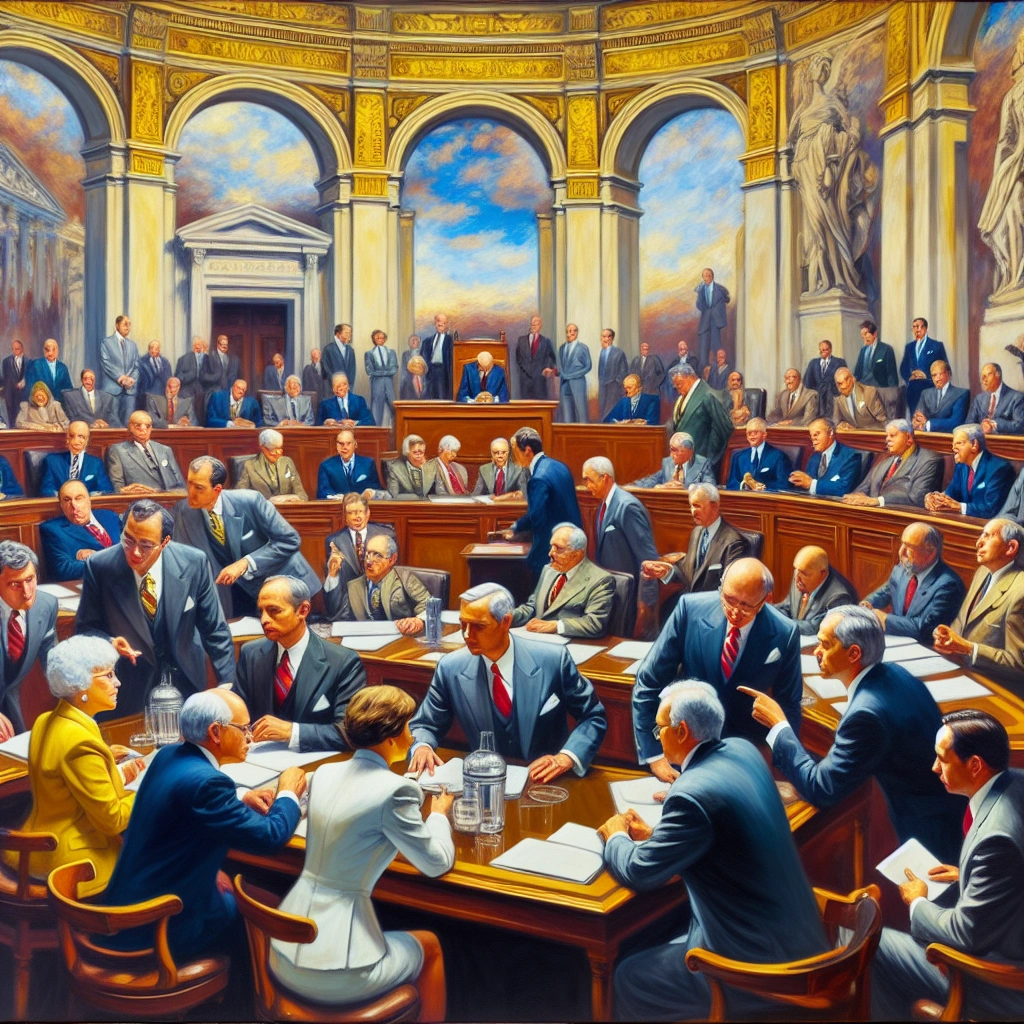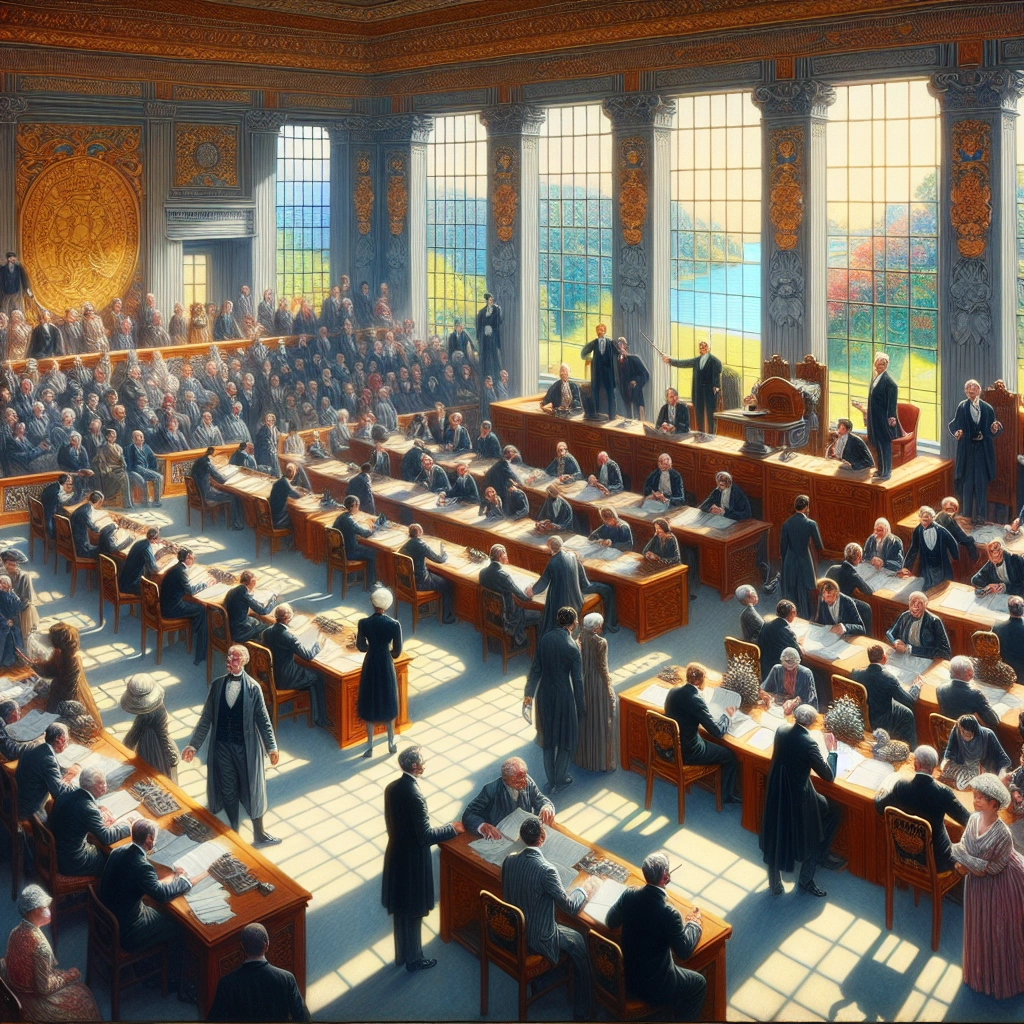How Do Lobbyists Influence And Impact Legislative Decisions Based: Best Practices


Lobbyists are individuals or groups that attempt to influence legislative decisions by providing expertise information to legislators, giving campaign contributions, and lobbying legislative and executive branch officials to act on their behalf.
Their influence on legislative decisions is significant, as they have various tools at their disposal to sway lawmakers and advocate for specific policy actions.
Understanding how lobbyists impact legislative decisions is important for citizens to comprehend the dynamics of the lawmaking process and the potential influence of special interest groups on public policy.
Check out this Youtube video: Learn how lobbyists influence and impact legislative decisions in this informative video on interest groups influencing policy making.
Historical Evolution of Lobbying
The origins of lobbying in the United States can be traced back to the early days of the American government, with unofficial lobbying efforts dating back to the formation of Congress. For example, in 1792, Virginia veterans of the Continental Army hired William Hull to lobby Congress for additional compensation, marking one of the earliest documented instances of lobbying in the country.
Significant historical moments when lobbying impacted legislative decisions include the crafting of the Constitution by influential figures such as James Madison. Their intention was to design a government system that would prevent powerful interest groups from dominating the general will.
Additionally, during the 19th century, lobbying primarily occurred within state legislatures due to the relatively smaller jurisdiction of the federal government in economic and legislative matters compared to state governments.
The historical evolution of lobbying in the United States dates back to the early years of the American government, with lobbying efforts playing a significant role in shaping legislative decisions and policies.
Types of Lobbyists
Different categories of lobbyists (corporate, labor, trade, etc.)
-
Corporate lobbyists: These lobbyists represent the interests of large businesses, advocating for policies that benefit their industry and corporate objectives. They often focus on tax laws, trade regulations, and industry-specific legislation.
-
Labor lobbyists: This category represents labor unions and workers’ rights organizations. They aim to influence policies related to wages, workplace safety, and employee benefits.
-
Trade lobbyists: These lobbyists work on behalf of trade associations and chambers of commerce to influence legislation impacting international trade, tariffs, and export-import regulations.
How each type of lobbyist influences legislative decisions based on their interests
-
Corporate lobbyists influence legislative decisions by funding political campaigns, conducting extensive research, and directly lobbying lawmakers to shape economic policies in favor of their corporate clients.
-
Labor lobbyists influence legislative decisions by organizing grassroots movements, conducting public campaigns, and directly lobbying policymakers to advocate for workers’ rights and fair labor laws.
-
Trade lobbyists influence legislative decisions by engaging in trade negotiations, providing economic data, and directly lobbying legislators to shape trade agreements and influence international trade policies.
Lobbying Techniques
Direct lobbying methods
- Personal Meetings with Elected Officials: Lobbyists engage in direct communication with elected officials to influence legislative decisions. These personal meetings provide an opportunity to articulate the interests they represent and persuade lawmakers on specific policy issues.
- Visits to the Staff of Public Officials: Lobbyists also utilize direct communication with the staff of public officials to convey their viewpoints and exert influence on legislative decisions.
Indirect lobbying methods
- Grassroots Lobbying Campaigns: Lobbyists engage in grassroots lobbying, attempting to influence legislation by affecting the opinions of the general public. This can be achieved through public opinion polls, mass media advertising, and efforts to mold both mass and elite public opinions.
- Elite Opinion Molding Efforts: Lobbyists employ indirect methods to shape the opinions of influential individuals, including decision-makers and key stakeholders, in order to indirectly impact legislative decisions.
Understanding the impact of each technique on legislative decisions
| Lobbying Technique | Impact on Legislative Decisions |
|---|---|
| Direct Lobbying Methods | Direct lobbying methods provide lobbyists with a more immediate and personalized approach to directly influence legislative decisions. Through personal interactions with lawmakers and their staff, lobbyists can effectively articulate their interests. |
| Indirect Lobbying Methods | Indirect lobbying methods, such as grassroots campaigns and public opinion molding efforts, aim to sway public opinion and indirectly impact legislative decisions. These methods seek to influence public sentiment, which in turn can affect policymakers’ decisions. |
The Role of Money in Lobbying
Financial contributions play a significant role in influencing legislative decisions. Political scientists have highlighted the struggle to determine the extent of influence campaign donors gain in the legislative process, emphasizing the impact of rent-seeking – using campaign contributions and lobbying to influence government policy for private gain.
Recent election cycles have seen record-breaking campaign fundraising and spending, with significant implications for legislative decisions. Studies acknowledge varied levels of influence that contributions have in the legislative process, with some finding little to no evidence of influence, while others identify significant impact based on circumstances.
How financial contributions influence legislative decisions
Financial contributions exert influence on legislative decisions through the leveraging of campaign contributions and lobbying to shape government policy for private gain. Studies have offered conflicting perspectives, with some suggesting minimal evidence of influence and others acknowledging significant impact under specific circumstances.
The legality and ethical considerations of financial influence in lobbying
Lobbying is legally protected by the Lobbying Disclosure Act of 1995, allowing the public to evaluate any undue influences affecting decision-making in the government. However, ethical considerations are paramount, requiring lobbyists to act with integrity, professionalism, and honesty at all times.
They are expected to avoid engaging in illegal or unethical behavior and uphold ethical standards, demonstrating a commitment to the common good.
| Legislative Decisions | Influence |
|---|---|
| Campaign Contributions | Varied Impact |
| Lobbying | Shaping Government Policy |
| Ethics | Integrity and Professionalism |
Financial contributions play a pivotal role in shaping legislative decisions, impacting governmental policies through lobbying and campaign funding. While the legal framework provides protection for lobbying activities, it is imperative for lobbyists to adhere to ethical standards and act in the best interest of the public good.
The Influence of Lobbying on Public Policy
Lobbyists, with their extensive networks and persuasive tactics, have successfully influenced various public policies. For instance, the tobacco industry’s lobbying efforts have impacted anti-smoking laws, and the pharmaceutical industry has influenced drug pricing policies.
Another example is the influence of tech lobbyists on data privacy regulations, shaping laws like the GDPR and CCPA to favor their interests.
Examples of public policies influenced by lobbyists
The lobbying by the National Rifle Association (NRA) has significantly impacted gun control legislation in the United States. The financial industry’s lobbying efforts led to the repeal of the Glass-Steagall Act, affecting banking regulations.
Moreover, lobbyists representing the fossil fuel sector have played a role in shaping energy and environmental policies, impacting initiatives such as the Paris Agreement.
Understanding the impact of lobbying on public welfare and interest
Lobbying has shaped public welfare and interest by swaying policies towards the benefit of specific industries rather than the broader public. The influence of pharmaceutical lobbyists has affected drug pricing, making medication less affordable for the general populace.
Similarly, lobbying by big oil companies has led to relaxed environmental regulations, undermining initiatives aimed at addressing climate change and protecting public health.
The Impact of Lobbying on Legislative Decision-Making Process
Lobbyists shape legislative priorities by actively engaging with lawmakers, providing them with research and facts about their issues, and offering history, context, and perspective on key topics. They ensure that the interests they represent are known and understood by elected officials, influencing the agenda of the legislative process.
How lobbyists shape legislative priorities
Lobbyists shape legislative priorities by providing in-depth information, research, and context to lawmakers, helping them to understand the significance of certain issues. Through their active engagement with policymakers, they ensure that the concerns and interests of their constituents are well represented, thus influencing the prioritization of legislative agendas.
The impact of lobbying on the content and language of legislation
The impact of lobbying on the content and language of legislation is substantial, as lobbyists often contribute to the drafting and writing of laws. They infuse their expertise and perspectives into legislative content, ensuring that it aligns with the interests they represent.
Lobbyists play a pivotal role in shaping the language and substance of laws, ensuring they reflect the needs and priorities of their clients.
The Role of Special Interest Groups in Lobbying
The influence of special interest groups on legislative decisions
Special interest groups exert influence on legislative decisions through lobbying and providing lawmakers with important information about policy proposals and their potential impact. By fostering close personal contacts with legislators, these groups build trust and credibility to persuade the government that their perspective is valid and essential.
They utilize various strategies and tactics, such as testifying in committees, to convey their stance effectively. Their ability to shape legislation lies in their capacity to articulate the technical details of policy proposals and sway lawmakers to align with their interests.
How special interest groups align with specific legislative initiatives
Special interest groups align with specific legislative initiatives by organizing individuals to take collective action through voting, fundraising, and disseminating information about their issues to elected officials. They carefully target lawmakers and members of relevant committees, understanding that garnering support from influential figures is pivotal in driving their legislative agenda forward.
By employing insider tactics, fostering strong relationships with the lawmakers, and capitalizing on political climate and party influence, these groups position themselves strategically to align with legislative initiatives that serve their interests.
| Persuasion Tactics | Description |
|---|---|
| Lobbying | Interest groups engage in direct lobbying efforts to influence legislation and policy by building relationships and articulating their standpoints effectively. |
| Grass-roots Campaigns | They employ grassroots efforts like letter writing, internet campaigns, and public demonstrations to gain media coverage and promote their cause. |
| Political Action Committees | These groups establish political action committees to support candidates and legislators aligned with their interests, thus amplifying their influence on specific legislative initiatives and policymakers. |
Special interest groups play a crucial role in influencing legislative decisions through their strategic lobbying efforts, leveraging their strong personal connections, and aligning with specific legislative initiatives to advocate for their interests effectively.
Transparency and Accountability in Lobbying
The need for transparency in lobbying activities
The need for transparency in lobbying activities is critical to ensure that the public has access to information about who is attempting to influence legislative decisions. It’s essential to have clear regulations and disclosure requirements for lobbyists, detailing their activities, financial contributions, and relationships with government officials.
This transparency helps to maintain the integrity of the legislative process and prevents undue influence from undisclosed interests.
Strategies for improving accountability in the lobbying process
Strategies for improving accountability in the lobbying process include implementing strict disclosure regulations, establishing clear definitions of lobbying activities, and creating a mandatory disclosure regime to ensure comprehensive knowledge regarding the financial backing of lobbying efforts. Additionally, there should be efforts to address compliance challenges, such as transparency in lobbying, and develop incremental strategies to enhance transparency and integrity in the overall lobbying process.
| Strategy | Description |
|---|---|
| Mandatory disclosure regime | Comprehensive knowledge regarding the financial backing of lobbying efforts. |
| Clear definitions of lobbying activities | Ensuring clear and unambiguous definitions of lobbying activities to prevent ambiguities and loopholes. |
| Addressing compliance challenges | Developing incremental strategies to enhance transparency and integrity in the overall lobbying process and achieving compliance. |
The Ethics of Lobbying
Understanding the ethical considerations of lobbying
Ethical considerations in lobbying involve recognizing and managing conflicts of interest responsibly. Lobbyists must prioritize the public interest while minimizing undue influence to uphold the integrity of their advocacy efforts.
This involves ensuring that no one stands up for the common good and that lawmakers solicit views from those not traditionally heard.
Counterarguments on the Influence of Lobbying
Criticisms of lobbying practices
Lobbying is often criticized for promoting special interests over the public good, leading to a lack of transparency in decision-making processes. Critics argue that lobbyists hold excessive influence in legislative decisions, potentially undermining the democratic principles of fair representation.
Additionally, the financial ties between lobbyists and politicians raise concerns about conflicts of interest and ethical implications. The perceived imbalance of power between well-funded lobbying groups and ordinary citizens has also sparked criticism regarding the fairness of the legislative process.
Response to counterarguments about the impact of lobbying on legislative decisions
Proponents of lobbying, however, assert that it is a fundamental expression of democratic rights, allowing diverse voices to participate in the policymaking process. They argue that lobbying provides opportunities for minority interests to gain representation and influence decisions, contributing to a more comprehensive and balanced legislative agenda.
Furthermore, lobbyists often serve as valuable sources of expertise, providing lawmakers with essential insights on complex issues. While criticisms exist, lobbying advocates emphasize the importance of fostering an inclusive environment for policy discussions and decision-making.
| Criticisms of Lobbying | Proponents’ Response |
|---|---|
| Special interest influence | Diverse representation |
| Lack of transparency | Minority voice empowerment |
| Conflicts of interest | Expertise contribution |
| Imbalance of power | Inclusive policy discussions |
Case Studies on Lobbying Influence
Real-life examples of lobbying impacting legislative decisions
- Lobbyists were able to sway the vote on a crucial environmental bill by connecting with key members of Congress and emphasizing the benefits to local economies.
- In another instance, lobbying efforts led to the development of consumer protection laws that had a direct impact on the financial industry, benefiting everyday citizens.
Analysis of the outcomes of lobbying efforts on specific policies
- Lobbying strategies resulted in the modification of tax laws, providing substantial financial advantages to certain sectors while generating economic growth.
- Moreover, lobbying initiatives successfully influenced healthcare policies, leading to improved access to vital medical services for underserved communities.
| Lobbying Impact | Legislative Decision |
|---|---|
| Environmental Bill | Vote influenced in favor |
| Consumer Protection Laws | Direct impact on financial industry |
| Tax Laws | Modification for economic growth |
| Healthcare Policies | Improved access for underserved communities |
This is the power of lobbying, where strategic influence can transform legislative decisions and shape policies for the benefit of diverse stakeholders.
The Impact of Grassroots Lobbying
How grassroots movements influence legislative decisions
Grassroots movements influence legislative decisions by mobilizing the public to advocate for specific policy changes. Through grassroots efforts, ordinary citizens become directly involved in contacting their elected officials, organizing demonstrations, and leveraging social media to raise awareness and support for their cause.
This bottom-up approach to lobbying allows for a diverse range of voices to be heard and can sway legislators to consider and prioritize issues that have widespread public support.
The effectiveness of grassroots lobbying compared to traditional lobbying methods
Grassroots lobbying can be more effective than traditional lobbying methods in influencing legislative decisions because it harnesses the power of collective grassroots support. When a large number of constituents actively engage with their representatives, it sends a clear message that the issue holds significant importance to the public.
This heightened pressure can significantly impact legislators’ decisions and compel them to take action in alignment with the desires of their constituents. Grassroots lobbying, therefore, has the potential to yield tangible legislative outcomes that may not be achievable through conventional, top-down lobbying efforts.
Ensuring Fair Representation in Lobbying
Strategies for ensuring fair representation of various interests in the lobbying process
One key strategy for ensuring fair representation of various interests in the lobbying process is to promote transparency and integrity. This involves providing all stakeholders with equitable access to the development and implementation of public policies.
Additionally, having a vibrant civil society that includes observers, representative citizens’ groups, and independent media is essential for proper scrutiny of the lobbying process.
The importance of balanced representation in legislative decision-making
Balanced representation in legislative decision-making is crucial for fostering the inclusion of diverse and minority interests. It ensures that the composition of public bodies reflects the demographics of the population, promoting justice and democracy.
Double representation in a bicameral legislature is a significant step towards balanced representation of rival interests, echoing a more just and inclusive goal than mere majority rule. Responsiveness to diverse and minority interests, as well as gender balance measures, contribute to achieving balanced participation in political and public decision-making.
Addressing Misconceptions About Lobbying Influence
Common misconceptions about the influence of lobbyists on legislative decisions
The common misconception about the influence of lobbyists on legislative decisions is that it is solely based on unethical practices and underhanded deals. However, in reality, lobbyists play a crucial role by providing valuable expertise and information to legislators.
They offer historical and contextual perspectives on key issues, aiding lawmakers in making informed decisions. Lobbyists can help predict the success or failure of a bill based on prior legislation or circumstances, contributing positively to the legislative process.
Clarifying the actual impact of lobbying on legislative outcomes
Contrary to popular belief, lobbying is a legal and essential practice for individuals and organizations to undertake public campaigns to urge governments into specific public policy actions. Lobbyists improve the legislative process by offering transparency, integrity, and specialized knowledge to legislators.
They also anticipate the impact of bills and provide valuable insights to lawmakers. Additionally, it is crucial to recognize that lobbying is not synonymous with bribery, but rather a means of fostering informed decision-making within the legislative realm.
The Future of Lobbying and Legislative Decision-Making
Anticipated changes in lobbying practices
- New technologies like AI and data analytics are expected to revolutionize lobbying practices, allowing for more targeted and effective advocacy efforts.
- Increasing emphasis on ethical and transparent lobbying practices, with stricter regulations and enforcement mechanisms to ensure integrity in the decision-making process.
- Growing focus on diversity and inclusion within lobbying organizations, aiming for more varied representation and perspectives to influence legislative decisions.
Predicting the future impact of lobbying on legislative decisions
- With the advancement of technology, lobbyists are expected to have a more data-driven approach, enabling them to make more precise and impactful arguments in favor of their causes.
- Greater public scrutiny and demand for transparency are likely to result in a more accountable and responsible lobbying landscape, shaping legislative decisions in a more informed and ethical manner.
- The influence of lobbyists on legislative decisions is poised to increase as their expertise and ability to bridge the gap between policymakers and public interests continue to be valued and utilized in shaping legislation.
Recommended Amazon Products for Understanding the Influence of Lobbying on Legislative Decisions
Here’s a curated list of products that can help you understand the influence of lobbyists on legislative decisions with ease. These recommendations are based on the relevance, quality, and popularity of the products.
Book Name: “Lobbying and Advocacy: Winning Strategies, Resources, Recommendations, Ethics and Ongoing Compliance for Lobbyists and Washington Advocates: The Best of Everything Lobbying and Washington Advocacy”


This comprehensive book provides an in-depth understanding of the strategies, resources, and ethics involved in lobbying and advocacy. It offers valuable insights into the legislative decision-making process and the role of lobbyists in shaping public policies.
Pros and Cons Table:
| Pros | Cons |
|---|---|
| Comprehensive | Lengthy |
| Insightful | Complex at times |
| Reputable | Expensive |
Documentary: “The Best Government Money Can Buy?”


This eye-opening documentary explores the impact of lobbying on legislative decisions, revealing the intricate relationships between policymakers and lobbyists. It provides real-life examples and case studies to illustrate the influence of money and special interest groups in shaping public policies.
Pros and Cons Table:
| Pros | Cons |
|---|---|
| Informative | Lengthy |
| Real-life examples | Limited availability |
| Thought-provoking |
Lobbying Board Game: “The Influence Game”


The Influence Game is an interactive board game that simulates the lobbying and legislative decision-making process. It offers an engaging way to understand the dynamics of lobbying, special interest groups, and the impact on public policy outcomes.
Pros and Cons Table:
| Pros | Cons |
|---|---|
| Interactive | Limited real-world context |
| Educational | Limited availability |
| Engaging |
Top Recommended Product for Understanding the Influence of Lobbying on Legislative Decisions
If you’re looking for the best solution to gain a comprehensive understanding of the influence of lobbying on legislative decisions, we highly recommend the book “Lobbying and Advocacy: Winning Strategies, Resources, Recommendations, Ethics and Ongoing Compliance for Lobbyists and Washington Advocates.” (https://www.amazon.com/s?k=Lobbying+and+Advocacy+Winning+Strategies+Resources+Recommendations+Ethics+and+Ongoing+Compliance+for+Lobbyists+and+Washington+Advocates) This book offers a reputable and insightful resource to delve into the complexities of lobbying and its impact on legislative outcomes.


Ready to enhance your understanding of lobbying and legislative decisions? Check out “Lobbying and Advocacy” (https://www.amazon.com/s?k=Lobbying+and+Advocacy+Winning+Strategies+Resources+Recommendations+Ethics+and+Ongoing+Compliance+for+Lobbyists+and+Washington+Advocates) today for a comprehensive insight!


Conclusion
Lobbyists influence and impact legislative decisions based on their ability to provide valuable information and expertise to lawmakers. By presenting evidence-based research and data, lobbyists can educate policymakers on complex issues and help them make well-informed decisions.
Furthermore, lobbyists also influence legislative decisions through their extensive network and relationships with key decision-makers. Their ability to connect policymakers with experts, stakeholders, and other influential individuals can sway legislative outcomes and shape policy priorities.
The financial resources and campaign contributions provided by lobbyists can also influence legislative decisions. By supporting political campaigns and providing financial backing to lawmakers, lobbyists can gain access and influence in the legislative process, ultimately impacting the decisions made by policymakers.


















